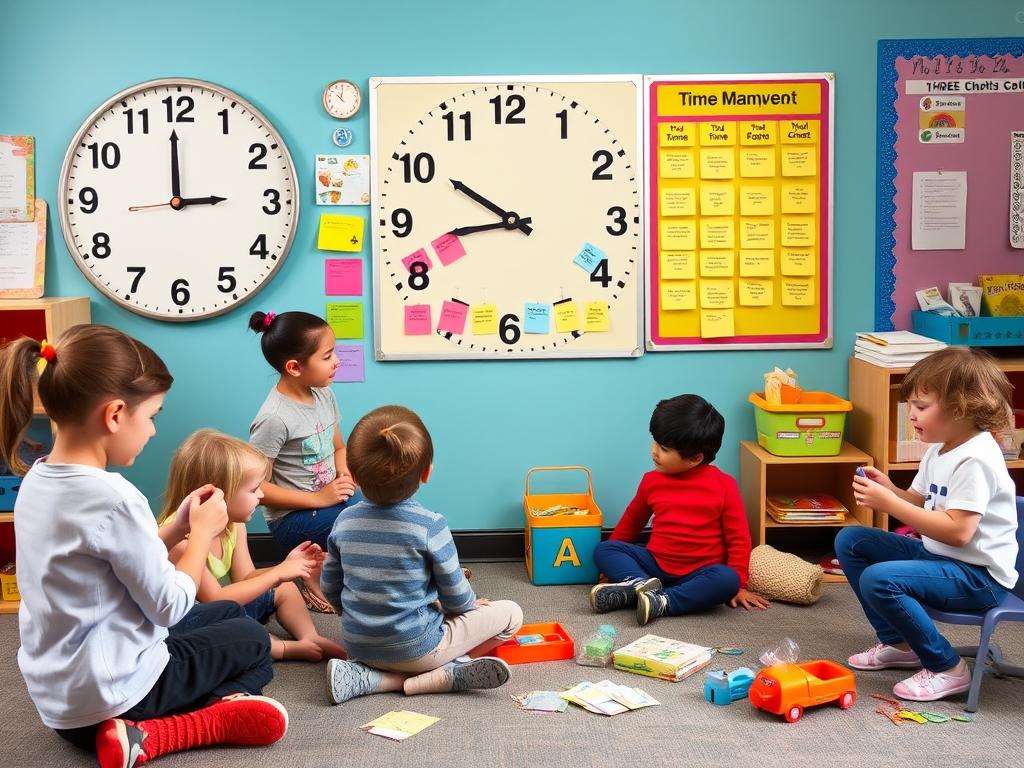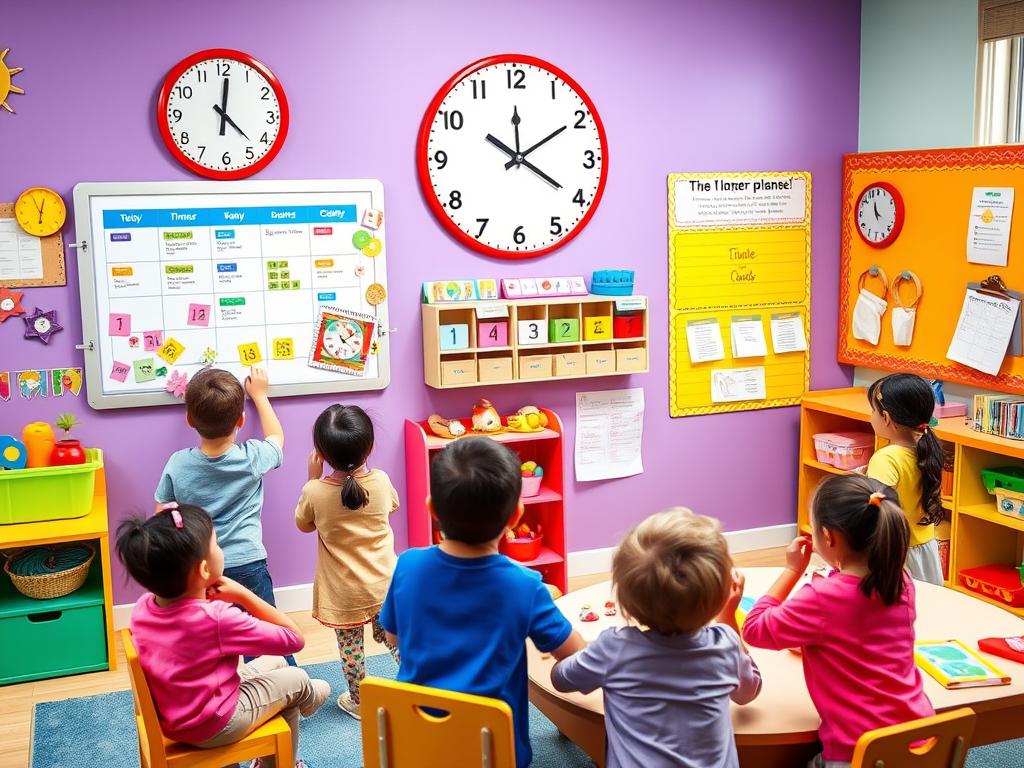Time Management: From the moment children start school, they begin to navigate a world filled with schedules and time constraints. One sunny afternoon, a mother watched as her daughter rushed through her homework, burdened by the looming deadline of a school project and juggling her favorite after-school activities. Frustrated by her stress, the mother realized that guiding her daughter on the journey of Understanding Time Management was essential for her development. This moment highlighted the importance of Teaching Children Time Management—an essential life skill that will empower them to balance academics, hobbies, and downtime.
Research indicates that instilling Time Management Skills at an early age helps children handle real-world challenges with resilience and confidence. As Dr. Lynn Meltzer notes, effective time management fosters better study habits and ultimately leads to improved academic performance. By equipping kids with this knowledge at home, parents can make a significant difference in their children’s capacity to prioritize tasks and allocate time wisely.
Emphasizing accountability for assignments, reinforcing Goal Setting, and creating a structured routine are just a few strategies parents can implement. The lessons learned now will not only help children thrive academically but will also prepare them for a well-rounded and responsible adulthood, minimizing stress and anxiety along the way. To explore more about the importance of these life skills, visit this insightful resource.
Key Takeaways
- Teaching Children Time Management helps reduce anxiety and promotes independence.
- Good time management leads to better academic performance and improved study habits.
- Parents play a vital role in modeling time management skills for their children.
- Setting clear goals and creating schedules can empower kids to balance responsibilities effectively.
- Introducing visual aids, like timers and schedules, enhances understanding of time management.
- Celebrating small successes reinforces positive time management habits.
- Teaching accountability helps children evaluate their time choices and make necessary adjustments.
The Importance of Time Management for Kids
Understanding time management extends beyond simply telling time. It involves planning, organizing, and balancing responsibilities that children face in their daily lives. Teaching Time Management to Kids is vital in helping them navigate tasks and prioritize effectively. Early lessons in time management set the stage for a lifetime of success and independence.
Understanding Time Management
At its core, time management for kids revolves around learning how to allocate time efficiently among various activities, including schoolwork, hobbies, and social outings. Children begin by grasping foundational concepts, such as the differences between ‘now’ and ‘not now.’ Over time, they refine these skills, balancing work and play while developing their ability to manage responsibilities promptly.
Benefits of Time Management Skills
Grasping the importance of time management introduces numerous benefits for kids. For instance, those who manage their time well enjoy academic success as they can allocate adequate time for studying, completing assignments, and preparing for tests. This skill reduces feelings of being overwhelmed, which in turn alleviates anxiety often associated with last-minute tasks. Additionally, as children engage in effective time management practices, their self-esteem and confidence grow through successfully meeting deadlines and responsibilities.
Real-World Applications
The real-world applications of time management lessons are far-reaching. Kids learn to prioritize tasks, make informed decisions, and ensure they have adequate time for rest and play—crucial elements for overall well-being. The values instilled through time management serve them throughout their lives, preparing them for the demands of the workplace. Implementing visual cues, color-coded time blocks, and other techniques can enhance their understanding further. Several educational institutions, including Sekolah Pelita Harapan (SPH), recognize this need and provide resources aimed at effectively teaching these life skills.
Incorporating lessons on time management helps children become more accountable and independent, providing them with tools to navigate not just academic challenges but life in general.
To learn more about balancing work and family life effectively, check out this valuable resource.
Strategies for Teaching Time Management
Teaching Time Management Skills to children involves practical techniques that enhance their ability to manage tasks effectively. Implementing strategies that focus on goal-setting, scheduling, and the use of timers can significantly assist children in understanding how to better organize their time. These techniques not only improve their academic performance but also contribute to their overall development.
Setting Clear Goals
Setting clear, achievable goals is essential for children to understand what they need to accomplish. Emphasizing the importance of clarity in their objectives enables them to focus their attention appropriately. Breaking down larger assignments into smaller, manageable tasks is a productive way to demonstrate the importance of planning. Kids Time Management Tips may include:
- Encouraging the use of vision boards to visualize their goals.
- Helping them articulate their aims in specific terms.
- Revisiting and adjusting their goals as necessary.
Creating Schedules
Creating schedules is an effective method for fostering organizational skills in kids. Visual schedules can represent daily and weekly tasks, making it easier for children to understand their commitments. Incorporating both timed and untimed activities allow children spaces to reflect on their learning outcomes. During this process, it’s beneficial to allocate “child time” for breaks. Utilizing planners can help establish routine while combatting chronic lateness.

Using Timers and Reminders
Using timers and reminders brings awareness to the passing of time. Kids often underestimate how long tasks truly take, so this approach aids in organizing their workload efficiently. Setting a minimum time for assignments encourages children to slow down and monitor their progress. Introducing a quiet time at the beginning of tasks can alleviate anxiety, enhancing their executive function. By allowing a visual representation of time through timers or apps, children will start to appreciate the importance of punctuality—an integrity marker in American culture.
| Strategy | Benefits |
|---|---|
| Setting Clear Goals | Improves focus and direction. |
| Creating Schedules | Enhances organizational skills and reduces stress. |
| Using Timers and Reminders | Increases awareness of time management and promotes punctuality. |
Utilizing these strategies can effectively promote time management skills in children, setting the foundation for responsible habits that impact their relationships, education, and future endeavors.
Fun Activities to Foster Time Management
Fostering time management skills in children can be enjoyable through various engaging activities. Incorporating fun Time Management Activities for Children ensures that learning remains light-hearted while effectively imparting essential skills. By utilizing interactive games and daily routines, parents can create fun time management strategies that encourage children to embrace these crucial life skills.
Interactive Games
Games can serve as excellent platforms for teaching time management in a playful environment. For example, engaging in a game of “How Long Is a Minute?” with a stopwatch can help children understand the passage of time effectively. These Fun Time Management Strategies allow children to learn while having fun, making time management feel less like a chore. Additionally, tools such as calendars and clocks can be integrated into kid-friendly devices from brands like Troomi Wireless, helping kids grasp time management concepts in a format they enjoy.
Daily Routines as Learning Tools
Incorporating daily routines into family life acts as a structured yet flexible framework for children to practice time management. Utilization of a family calendar allows everyone to visualize commitments, making it easier for kids to understand their responsibilities. When children participate in household chores, they acquire Kids Time Management Tips, learning how to prioritize tasks effectively. A family chore chart can also provide them with visual aid, helping them grasp how to manage their time efficiently.
Celebrating Time Management Success
Recognizing and celebrating accomplishments in time management can significantly boost a child’s confidence. Small celebrations for completing tasks on time reinforce positive behaviors. Creating competitions like Chore Olympics does not only motivate children to prioritize but also makes the process thrilling. Establishing an environment where achievements are acknowledged helps solidify the learning of time management skills, ultimately preparing children for future challenges.

| Activity | Purpose | Benefit |
|---|---|---|
| Interactive Games | Engaging children in time-based challenges | Enhances understanding of time management concepts |
| Daily Routines | Structured frameworks for responsibilities | Teaches prioritization and accountability |
| Chore Competitions | Motivate task completion | Increases enjoyment and productivity |
Common Challenges and Solutions
Teaching effective time management skills to children encompasses various common challenges. Overcoming procrastination often emerges as a substantial hurdle. Kids may delay starting tasks, leading to stress as deadlines loom. A practical solution involves breaking larger assignments into smaller, manageable pieces. For example, Sarah, an 8-year-old, finds success by tackling her homework in 30-minute segments, allowing her to stay focused and less anxious.
Overcoming Procrastination
Addressing procrastination requires patience and understanding. Teaching children to use tools that suit their learning styles can significantly enhance their time management abilities. For instance, Emma, a 15-year-old, utilizes a digital planner app that keeps her accountable for her assignments and deadlines. Incorporating these strategies early can instill self-discipline, a vital life skill that offers benefits long into adulthood.
Balancing Screen Time and Productivity
In today’s digital age, balancing screen time and productivity emerges as another challenge for many families. Setting clear guidelines around technology use can promote healthier habits. The Johnson family exemplifies this practice by creating weekly schedules that prioritize schoolwork, sports, and leisure activities. They encourage their teenage son to allocate specific times for screen activities, ensuring that productivity remains high.
Adjusting to Individual Learning Styles
Every child possesses unique learning styles, making customized time management techniques essential. Visual learners may benefit from tools like large whiteboard calendars, used effectively by the Green household. Others might find success through auditory or kinesthetic methods. For instance, establishing family calendars, as seen in the Patel family, fosters shared accountability and awareness of everyone’s schedules.

Through collaborative peer support groups, like Lucas’ study group, children can share challenges and strategies, building a sense of community around time management skills. Holding regular check-ins helps families regroup, address obstacles, and adjust strategies proactively. Effective time management practices enhance focus, control, and resilience, ultimately allowing children to thrive both academically and emotionally.
For those seeking more guidance on improving time management skills, resources are available that provide assessments and tools, helping parents and children identify needs and set actionable goals. Explore these essential materials on time management skills for enriching insights.
Supporting Children in Their Time Management Journey
As children learn to navigate their schedules, encouraging independence becomes a pivotal part of their time management journey. Allowing kids to take ownership of their tasks not only builds their confidence but also enhances their decision-making skills. For instance, when children tackle age-appropriate chores or set clear goals for their assignments, they learn the importance of prioritization and self-regulation, key components that significantly enhance their time management skills.
Encouraging Independence
Regular check-ins and feedback are essential for guiding children as they develop their time management abilities. These moments provide opportunities for parents to reflect with their children on what strategies work well and what obstacles may need addressing. Utilizing resources from local organizations in San Diego can further support these discussions, offering kids time management tips and engaging activities that reinforce their learning.
Regular Check-ins and Feedback
Creating a positive environment for learning is crucial in strengthening children’s time management skills. Celebrating achievements, no matter how small, fosters a growth mindset and motivates kids to embrace challenges. This supportive atmosphere should include visual aids and tools, like chore charts or monthly calendars, which help visualize responsibilities. By ensuring children feel safe and valued in their learning process, we can help them build resilience and independence for the future.











